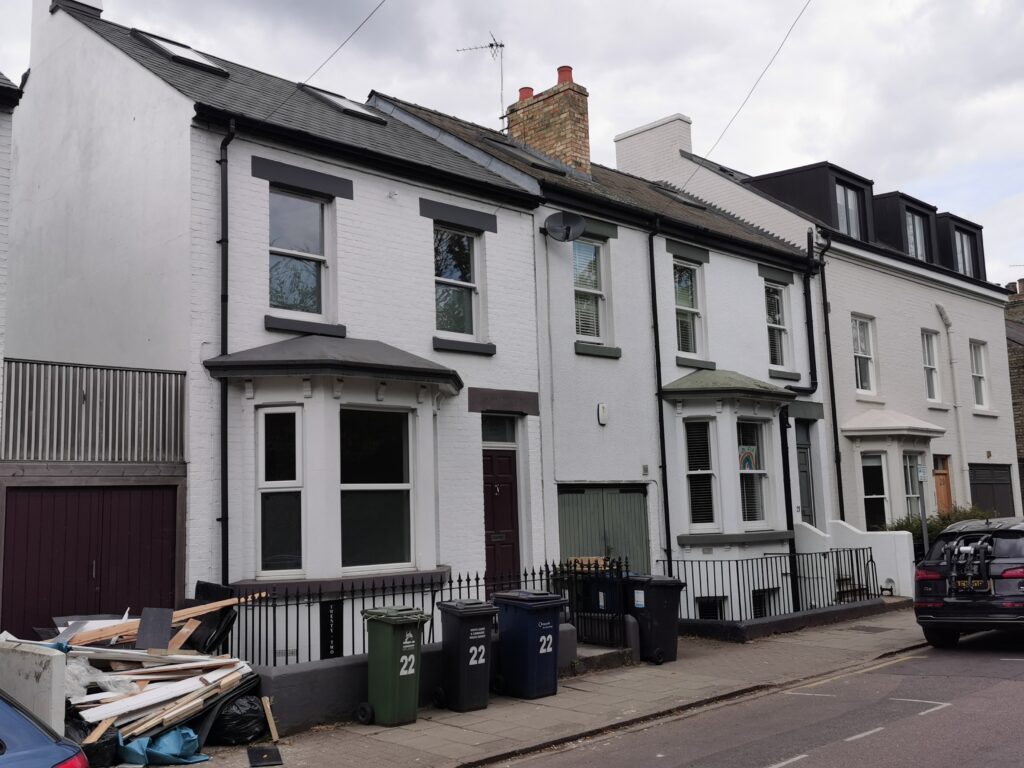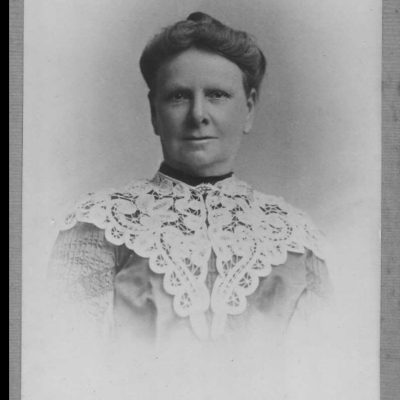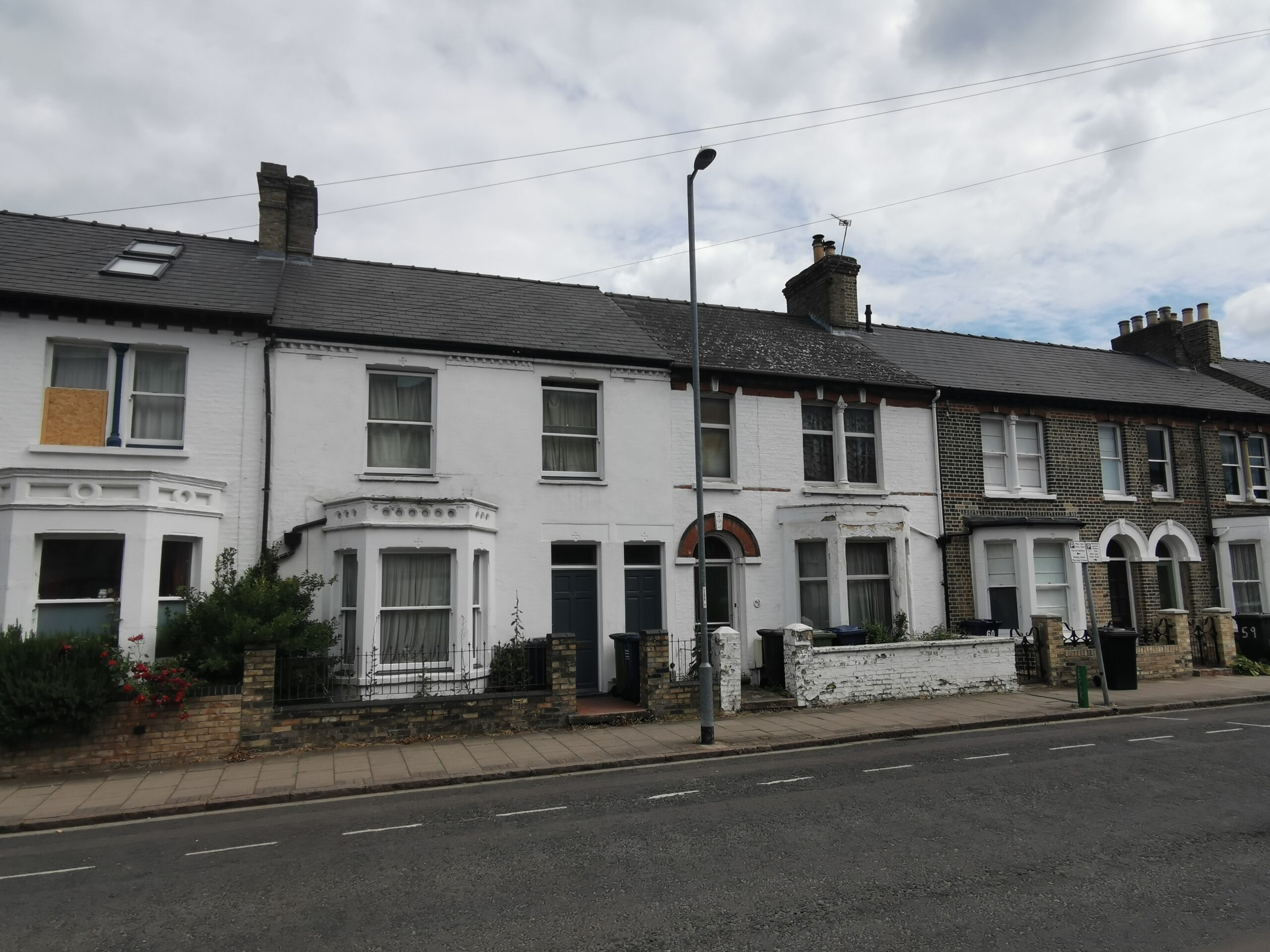Search by topic
- archaeology
- Building of Local Interest
- chapel
- charity
- church
- crime
- dressmaker
- fire
- Great Eastern Railway
- Listed building
- Mapping Relief
- medieval
- oral history
- poverty
- Public House
- Religious House
- Roman
- scholar
- school
- Then and Now
- tudor
- women
- work
- world war one
- world war two
Search by text
 20-22 Devonshire Road Cambridge
20-22 Devonshire Road Cambridge21 Devonshire Road
History of 21 Devonshire Road
1901
William Armstead, 34, compositor, b Cambridge
A N, wife, 35, b Cambridge
William Mallty, 73, father in law, retired police inspector, b Cambridge
1911
Thomas Charter, 33, carpenter, b Cambridge
Ethel May, 27, b Cambridge
Thora Mary, 9mos, b Cherry Hinton
1913
Thomas William Beaumont
1950
Edward Katon and Joyce née Mansfield moved here after their marriage in 1950. He worked for Pye and had been living at 165 Chesterton Road. She had lived with her family at 11 Darwin Drive.
He left behind a detailed account of many episodes of his life, some of which are reproduced in Capturing Cambridge.
We managed to get unfurnished rooms in Devonshire Road Cambridge. The ground floor was several steps above the pavement, the other two rooms were in the basement. Daylight to the front basement came through a casement window with the street outside at eye level. The space between the house and road, about a metre, could only be reached by climbing through the window. The front basement room had a fireplace in the wall adjacent to the window and on the sidewall of the semi detached house. There was waist high cupboard each side of fireplace and a large cupboard housing the two gas meters (coin-operated) and the two electric meters (not coin-operated). In the other basement room was an old-fashioned fire oven in the sideboard and a window, over the sink, in the rear wall. And a large cupboard as a larder. There was a gas point black for a gas cooker on the dividing wall. The outside door led to a covered in space. To your right, a coal shed, to your left up a few steps a door into a recess which contained the only lavatory in the whole house and was shared by us and the people upstairs. Entry to the garden was up a few more steps through another door. That place was like a small conservatory with a felt covered roof. The upstairs back bedroom was big enough for a double bed with our 12 months old daughter’s cot between bed and wall. A fireplace near the bottom of the cot and dressing table mirror unit against the window and wardrobe near the door. We were not happy when we learnt that flooding occurred when there was a big rain storm. The drains could not cope with the mass of water and went into the sewers. A sudden heavy downpour and sewage came out of the toilet and flooded the kitchen and front room. It had flooded 1 month before we moved in. We were there for four and a half years before our name came up on the council housing list, and many times during storms the water rose up to the outside of the front window sill. We negotiated with the landlady and had the front room overlooking the road as well. We did not live in the basement rooms, but had to do the cooking there. There was no bathroom. We had to buy a bungalow bath. You put it on the floor in front of a nice warm fire, filled it up with hot water you boiled on the cooker. The first thing you found on stepping into the bath wast that your feet were cold and sitting in a bath with cold water on your backside and hot water near the top was not nice. After the first time loads of newspapers were put on the floor to insulate the bath. The garden was about 40 foot square. A lawn in the centre, a 2 foot path all round that and a 3 foot border up to 6 foot high brick wall. On the left side looking out an apple and pear tree, on the right, a pear, a plum and apple tree. And a shared washing line.
We got on quite well with the three upstairs people. An Irish Grandmother and her teenage grandson and granddaughter who were always at Loggerheads. The grandson worked on the railways as a fireman on the steam trains and had peculiar times to work like starting at 4.13 am in the morning. The grand daughter, I believe, worked in a photographic shop. The two rooms in the basement were very damp so we did not live down there, only used the back room for cooking and bathing, washing and shaving. The railway steam engines boilers were emptied in the yards over the road, no houses on that side of the road then, and soot blew everywhere. Wipe the table top for instance, then come back 10 minutes later and write your name in the dust that had collected there.
We moved into the place on a Saturday morning. Father-in-law came on Sunday with a sledgehammer and, with the landlady’s permission knocked down the old-fashioned clothes boiler you lit a fire under and also a concrete indoor water tank near the sink. It collected the rain water from the roof, with an outlet pipe to prevent overflowing into the kitchen. It was open at the top and the water was stagnant and stank and lots of flies congregated near it. The very next day the sanitary inspector called. We have not sent for him. He looked around the cellar room and then told us that if we had left the boiler and water tank as they were, he would have condemned and we would have been given a council house. A great pity we thought, but you never know know how life turns out and hindsight is a wonderful thing.
Life was not all gloom and doom in Devonshire Road. There were no houses on the opposite sides of the road then. Directly opposite us was a timber yard with a man busy stacking long planks and turning them over every 3 days. They warped (bent) as they seasoned and were turned over to warp the other way and ended up straight. Our daughter Susan sat in her pram by the window and watched everything going on. We did not take the pram into the garden, because there was no life in it and where we lived previously there was my wife’s big family and lots of noise and if it was quiet Susan got worried. Traffic passing by kept her interested and great fun. For her were the neighbours on the other side of a semi-detached house. They were a family building business. The family consisted of middle-age father slightly older mother, 3 sons in the 20s and a mentally handicapped daughter about 12 years old who went to a special school. The fun came when for instance two of the ‘boys’ were loading bricks on to one end of the lorry and the other one was removing them. Eventually the first two would realise what was going on and there would be uproar. Susan thought them arguing and shouting was funny and laughed and laughed. They bought a private big car, a Sunbeam if I remember rightly, with fold down roof. The bonnet stretcher nearly as long as the car and they hitched a trailer to it and went on a camping holiday. Sometime after their holiday they rewired it. It spent time in front of our place and one day when I cycled home from work I saw big white splashes on our front windows. It appeared that the car suddenly caught fire. Next door alerted to this rushed out with old-fashioned fire extinguishers that were shaped like periscopes and you flicked the contents onto the fire. They put the fire out eventually. Some of the contents had gone over the car and onto our windows or if they were not standing in the road but on the path that thrown the stuff backwards onto our windows. They told my wife they would clean the windows. However I got a bucket of water and soon cleaned them.
Four and a half years after moving into Devonshire Road we knew our home was coming up on the council housing list, when our dismay the housing department wrote a letter to us saying that as we were in a four roomed unfurnished flat we were adequately housed and they had taken our name off their housing list. We did not accept that and went to see them about it. We had an argument, but they stuck to their guns. Every morning for a month I called into their office and we had a blazing row. They then had a policeman standing right next to me but I wasn’t bothered because I knew there was nothing he could do unless I physically threatened them or swore at them. He was a big man and I thought he was amused by it all. In the afternoons my wife used to wheel our baby in the pram into the housing office and also kick up a fuss. After the council lady told me they were fed up with us and I told her we were also fed up, and all we wanted to be was reinstated back on the housing list to where we had been. Next thing we received a letter from them telling us that they were sending the sanitary inspector round to look at our place. I laughed. ‘You know what that means’ I asked my wife Joyce. ‘No’ she said. ‘The departments don’t communicate with each other, unless they have to. They will wait for months and then say it’s too late to do anything.’ So that morning I called in at the sanitary department office and a young youth in there cheeked me. I gave him a loud telling off and finished by saying that I expected respect from those whose wages I help to pay. A lady intervened and I showed her the letter from the council. ‘We know nothing about this’ she said after reading it. ‘What do you want?’ she asked. ‘I only called in to find out the time your inspector will call so I can let my wife know to be in when he comes.’
The place was normally damp, especially in the basement rooms, but for one month in the summer when it was a hot, it dried out. ‘We will show him as it is normally the rest of the year’ I said. So each evening we filled the washing copper with water, lit the gas burner ring and steamed up the basement. On top of the waist high cupboards each side of the fireplace, piled two or three newspapers and set on each one a bucket of steaming hot water. The first time he called my wife was out shopping and the lady upstairs showed him round. This annoyed us she shouldn’t have done it and we had not been informed of his impending visit. He came three times more when my wife was in. Each time he did and said the same things. Inside the front door, took 3 steps forward and said ‘This is not a flat, it’s rooms.’ (A flat is where you are totally self-contained.) Three more steps then he said ‘This place is damp.’ After looking in the two ground floor rooms he descended into the basement rooms and seeing the communal toilet was obviously not very impressed. The landlady lady lived further up the street and when he called and asked if she was prepared to make improvements she was emphatic that she would not. He gave his report and soon after we had a letter from the housing department to say we had been restored to the housing list. Three weeks later we received an offer of a two-bedroom house on the south Arbury estate and moved to there. In the meantime we looked at the agreement we signed when going into Devonshire Rd. We had to decorate the flat inside and out. Two packs of green distemper covered the cellar walls, and ceiling white did the ceilings for all the rooms, inside the cupboards, stairs and ceiling. My father-in-law had recently moved house and painted inside and outside and left a huge pile of paint tins in the back garden. Taking the biggest tin and a paintbrush, I opened everything and put the contents into the big tin, from nearly full to teaspoon full. The only exception was a nearly full tin of deep brown which I kept for the back door and cupboard doors. Someone at work found a half tin of a horrible yellow and that covered the front door, ground floor window and basement windows. The big tin’s colour was a dark green and was used on all the inside wood connected to part of the house. I bought a large tin nearly as big as an oil drum of beige paint for 7 shillings and mixed some of father-in-law’s post office red paint in it, then a stiff brush cleaned the railings and painted them. I just had enough paint.
Knowing the landlady would be furious, especially with the yellow colour door and window frames, I carefully cleaned the tin to reveal the colour. It was ‘Golden Brown.’ She was in a foul temper, knowing she was a diabetic, my father was also diabetic. I knew how to deal with her. ‘Who painted that house that horrible colour?’ Shouted when I went over to pay the rent. ‘I did’ was my reply. ‘Nice colour isn’t it?’ That calm reply, I was nearly laughing at her and she could see it. She calmed a bit and demanded ‘What colour do you call it?’ ‘Golden Brown of course’ I said. ‘Why didn’t you paint the whole house?’ ‘Don’t rent the whole house’ was the answer. ‘Why didn’t you paint the garage doors?’ she persisted. ‘I don’t rent the garage doors.’ ‘Your father-in-law does.’ ‘Tell him to paint them’ she demanded. ‘I’ll tell him’ I said. I doubted that he would and laughed when I told him. I will not repeat what he said. Joyce was a bit upset about it. ‘What will people think’ she asked. ‘This is Cambridge students’ I said.
A few days later we sat in a train carriage waiting to go to see my mother in Sleaford. We could see our street. Suddenly the door opened and a young man, his wife and daughter, about the same as our daughter, lost in thought gazing out of the window. Their girl was very lively jumping about. ‘If you sit still and look out of the window you will see that house half painted’ they told her. The train moved and the house came in to view. ‘I reckon that was students who did that’ she was told. I looked at Joyce and neither of us said anything and our daughter kept quiet.
We moved into a council house soon after and Joyce’s youngest sister, husband and three year old son moved into Devonshire Road. Conditions were that they painted all of the front of the house pale mauve and cleaned out the guttering so that any rainwater from the over flowing gutter didn’t fall on anyone standing at the front door.A month after we moved out there was a torrential storm, the drains could not cope with the extra water which went into the sewer and where we lived was flooded when the sewage came up out of the lavatory pan and flooded the two cellar rooms. The fire brigade came and refused to put their hoses in that muck and my brother in law had to empty all the sewage back down the toilet. We had a lucky escape.
1962
Dennis R Sparkes
1970
Dennis R Sparkes
Contribute
Do you have any information about the people or places in this article? If so, then please let us know using the Contact page or by emailing capturingcambridge@
Licence
This work is licensed under CC BY-NC-SA 4.0












